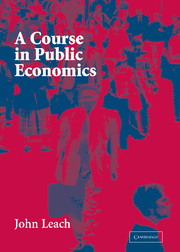Book contents
- Frontmatter
- Contents
- List of Figures
- Preface
- 1 Introduction
- Markets
- Externalities
- Public Goods
- Imperfect Competition
- Taxation and Efficiency
- 16 Taxation
- 17 The Welfare Cost of Tax Interactions
- 18 The Theory of the Second Best
- Asymmetric Information and Efficiency
- Asymmetric Information and Income Redistribution
- A Note on Maximization
- References
- Index
17 - The Welfare Cost of Tax Interactions
from Taxation and Efficiency
Published online by Cambridge University Press: 06 July 2010
- Frontmatter
- Contents
- List of Figures
- Preface
- 1 Introduction
- Markets
- Externalities
- Public Goods
- Imperfect Competition
- Taxation and Efficiency
- 16 Taxation
- 17 The Welfare Cost of Tax Interactions
- 18 The Theory of the Second Best
- Asymmetric Information and Efficiency
- Asymmetric Information and Income Redistribution
- A Note on Maximization
- References
- Index
Summary
Society's net benefit from trade in any good is maximized when the good's social marginal benefit is equal to its social marginal cost. This outcome is achieved in a market economy if these two conditions hold:
The private marginal benefit of consuming each good is equal to its social marginal benefit, and the private marginal cost of producing each good is equal to its social marginal cost.
Production and trade continue until private marginal benefit and private marginal cost have been equalized.
We have already examined a number of reasons why these conditions might be violated in some markets. The first condition is violated if there are public goods, externalities, or taxes; and the second condition is violated if the good is produced and sold by a monopolist or a monopolistic competitor.
If marginal social benefit and marginal social cost are not equalized in some market, economists say that the market is distorted. The gap between marginal social benefit and marginal social cost is called the market distortion. It was shown in Chapter 5 that if only one market is distorted, the welfare cost of that distortion can be discovered by examining only the distorted market. It was also shown that the welfare cost of a new distortion in an already distorted economy is more difficult to measure, because the new distortion can change the welfare cost of the existing distortions.
- Type
- Chapter
- Information
- A Course in Public Economics , pp. 256 - 271Publisher: Cambridge University PressPrint publication year: 2003



